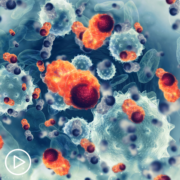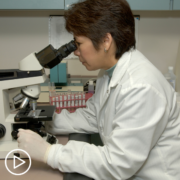Are There Any Long-Term Side Effect Risks for CLL Patients?
Are There Any Long-Term Side Effect Risks for CLL Patients? from Patient Empowerment Network on Vimeo.
Chronic lymphocytic leukemia (CLL) patients are at-risk for some treatment side effects. Watch as Dr. Nadia Khan from Fox Chase Cancer Center shares how side effects can vary by treatment type and some side effects for CLL patients to be aware of.
Related Programs:

|

|
Transcript:
Mary Leer:
George asks, are there any long-term side effect risks for CLL patients?
Dr. Nadia Khan:
That’s a great question, George. It really would depend on the therapy being instituted and when in the chemoimmunotherapy era for CLL patients, we have a very different perspective of what short-term and long-term side effects were and are for those patients who have been treated with chemoimmunotherapy. For patients treated with targeted therapies and immunotherapy combinations today, there tends to be fewer serious long-term side effects when looking at the various drug classes. For example, BTK inhibitors, there is a risk of atrial fibrillation that remains constant throughout the course of therapy, and if a patient is on therapy for one year or 10 years, they can develop that particular side effect. High blood pressure can be significant with BTK inhibitors as well, and that risk also tends to be stable. In terms of infection risk, there is relative immunosuppression with all CLL therapeutics, and so our concern, more recently has been focused on COVID infection, serious bacterial and viral infections tend to be less frequent, we don’t institute prophylaxis for those infections because they tend to be so few and far between in the patients that we’ve treated.







